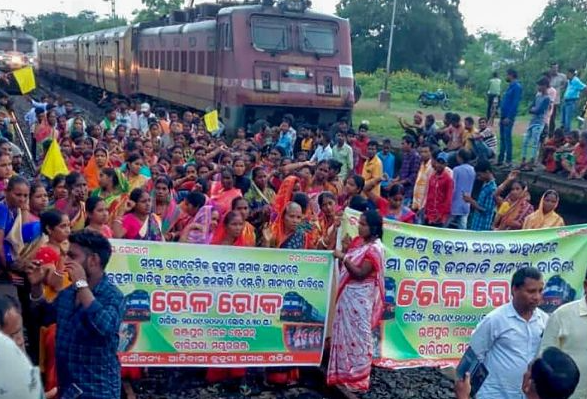Ranchi: Several Kurmi organisations have called for an indefinite rail blockade at nine railway stations in Jharkhand, West Bengal and Odisha from September 20 demanding Scheduled Tribe (ST) status for the community and inclusion of the Kurmali language in the eighth schedule of the Constitution.
In these three states, the community is listed among the Other Backward Classes (OBCs).
President of Totemik Kurmi Vikas Morcha (TKVM), a leading body in Jharkhand fighting for Kurmi’s rights, Sheetal Ohdar, on Monday said that the movement is being organised by various organisations including Adivasi Kurmi Samaj of West Bengal and Kurmi Sena of Odisha.
The indefinite movement will begin at Muri, Gomoh, Nimdih, Ghagra stations in Jharkhand, Khemasuli and Kustaur in West Bengal, and Harichandanpur, Jaraikela and Dhanpur in Odisha from September 20, he told reporters here.
“Thousands of people from the Kumi community will participate in the agitation with their traditional costumes, drums and other musical instruments and perform Chhau dance, Pata dance, Natuwa dance, Horse dance and Jhumar dance,” Ohdar said.
This is the second major agitation of the Kurmis for the same demands in two years.
A year ago on September 20, the organisations called for a rail blockade which continued for five days, disrupting railway traffic on the route.
Demanding that the Centre provide ST status to Kurmis during the ongoing special session of Parliament, Ohdar urged the MPs belonging to the community to raise the demand in the House.
Central spokesperson of the Adivasi Kurmi Samaj (AKS) Harmohan Mahto claimed that Kurmis were listed among aboriginal tribes in 1913 during the British era.
“When the Centre notified ST list on September 6, 1950, Kurmis were put in the list of other backward castes (OBC) in West Bengal, Bihar and Odisha,” he claimed.
Kurmis have been tribal since ancient times, Mahto said claiming that their population in the three states would be more than two crores.






